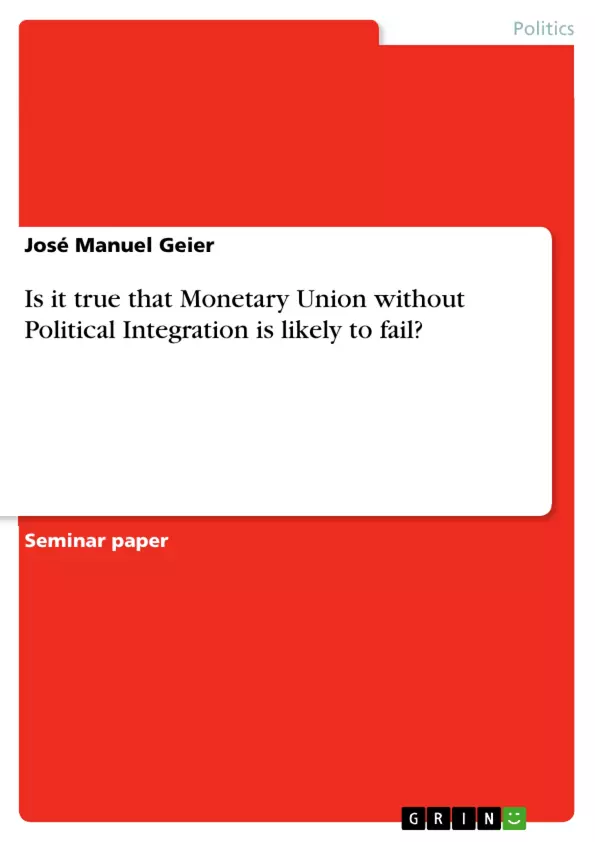The monetary union has proved to be a highly sensitive area of European Integration, as there are several Member states who decided to opt out or have not yet adopted the euro as their currency. Especially during the international banking and financial crisis which later turned into the eurozone crisis, monetary union has been discussed fiercely to the extent that there have been calls to expel Greece from the euro.
As Andrew Moravcsik puts it, the nature of the eurozone was a ticking time bomb (2012). Even Mario Draghi described the incomplete financial integration as the “Achilles’ heel” of the Economic and Monetary Union (2014). During and after the crisis, however, the Member states have implemented a number of institutions and instruments, trying to solve the current crisis and to make the monetary union more sustainable.
The question of this essay is whether the monetary union is likely to fail if there is no further political integration. The essay is structured as follows. In the second chapter I outline the main causes and consequences of the crisis. In the following chapter I demonstrate the theory of Optimal Currency Areas and discuss to what extent the EMU fulfils the criteria. The fourth chapter points out institutional adjustments that have been introduced since the beginning of the crises and suggest further steps. On this basis, chapter five and six discuss the need for political integration and debate measures such as a budgetary union.
Inhaltsverzeichnis (Table of Contents)
- Introduction
- Causes and Consequences of the Crisis
- Is the Eurozone an Optimum Currency Area?
- The Theory of OCA
- Is the Eurozone an OCA?
- Institutional Adjustments since the Beginning of the Crisis
- The Need for Political Integration
- Political Integration and the Future of the Eurozone
Zielsetzung und Themenschwerpunkte (Objectives and Key Themes)
This essay aims to assess whether a monetary union is likely to fail without further political integration. It investigates the causes and consequences of the eurozone crisis, examines the theory of Optimum Currency Areas and its applicability to the EMU, and analyzes institutional adjustments implemented since the crisis.
- The Eurozone Crisis and its Causes
- The Theory of Optimal Currency Areas (OCA)
- Institutional Adjustments and Reforms
- The Need for Political Integration
- The Future of the Eurozone
Zusammenfassung der Kapitel (Chapter Summaries)
- Introduction: The essay sets out the context of the eurozone crisis and its implications for the future of the monetary union. It poses the central question of whether the monetary union is likely to fail without further political integration.
- Causes and Consequences of the Crisis: This chapter explores the key factors leading to the eurozone crisis, including the global financial crisis, the subprime mortgage crisis, and the vulnerabilities of certain member states. It analyzes the impact of the crisis on the eurozone's economies, highlighting the consequences for various member states.
- Is the Eurozone an Optimum Currency Area?: This chapter delves into the theory of Optimal Currency Areas (OCA) and its relevance to the eurozone. It examines the criteria for a successful currency union and assesses whether the eurozone meets these criteria, considering factors such as trade integration, business cycle synchronization, labor and capital mobility, and risk-sharing mechanisms.
- Institutional Adjustments since the Beginning of the Crisis: This chapter discusses the various institutional adjustments and reforms implemented by eurozone member states to address the crisis and enhance the sustainability of the monetary union. It highlights key initiatives and their effectiveness in mitigating the challenges faced.
- The Need for Political Integration: This chapter explores the arguments for and against further political integration within the eurozone. It examines the potential benefits and drawbacks of deeper political cooperation, focusing on issues such as fiscal coordination, shared sovereignty, and the implications for national autonomy.
Schlüsselwörter (Keywords)
The essay focuses on the eurozone, monetary union, political integration, economic crisis, Optimal Currency Area (OCA), fiscal transfers, institutional adjustments, austerity policies, and the future of the eurozone.
Frequently Asked Questions
Is political integration necessary for a monetary union to succeed?
The essay explores this central question, analyzing whether the Eurozone can survive long-term without deeper political cooperation and fiscal coordination.
What is the "Optimum Currency Area" (OCA) theory?
OCA theory outlines criteria—such as labor mobility, capital flexibility, and similar business cycles—that determine whether a geographic region would benefit from a single currency.
Does the Eurozone fulfill the criteria of an Optimum Currency Area?
The essay discusses the extent to which the EMU meets these criteria, often highlighting gaps in labor mobility and risk-sharing mechanisms compared to other currency areas.
What were the main causes of the Eurozone crisis?
Causes include the global financial crisis, the subprime mortgage collapse, incomplete financial integration, and the specific economic vulnerabilities of member states like Greece.
What institutional adjustments have been made since the crisis?
Member states implemented various instruments and institutions to solve the crisis and make the monetary union more sustainable, though many argue these are still incomplete.
What is meant by a "budgetary union"?
A budgetary union refers to a higher level of fiscal integration where member states share certain budgetary responsibilities or transfers to stabilize the currency union.
- Quote paper
- José Manuel Geier (Author), 2018, Is it true that Monetary Union without Political Integration is likely to fail?, Munich, GRIN Verlag, https://www.grin.com/document/431201



